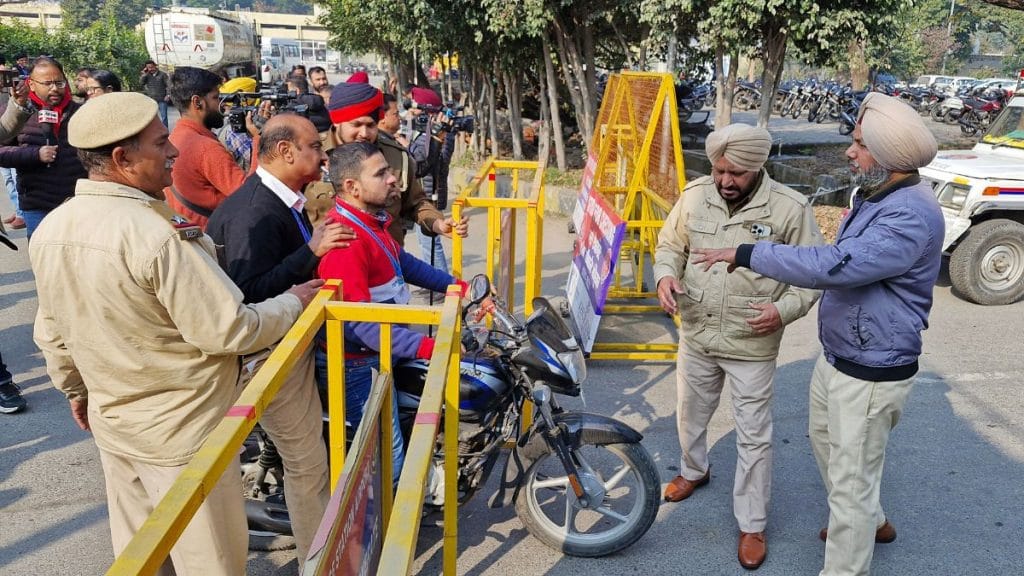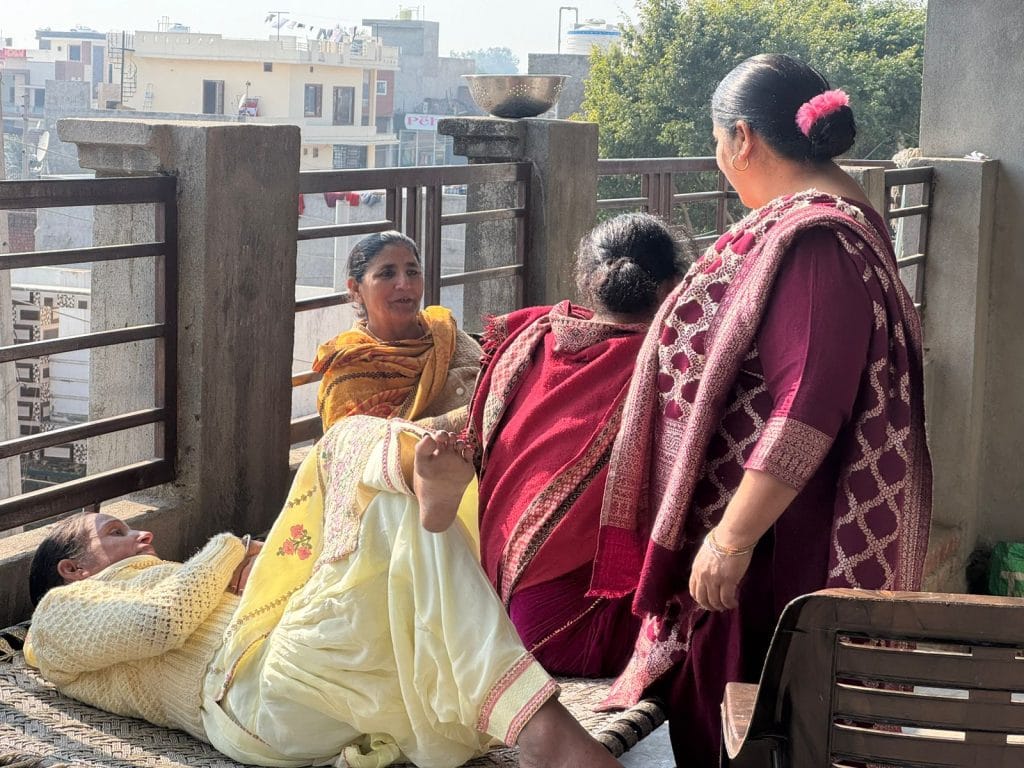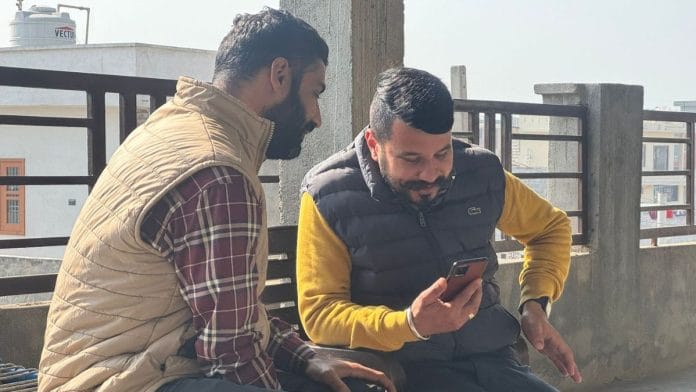Gurdaspur: Sri Guru Ram Das International Airport in Amritsar Wednesday had two contrasting worlds of Indians who migrate. On one side, family members eagerly waited with roses and chocolates to receive their loved ones coming from Canada and the UK. On the other side, there was chaos. Punjab police had cordoned off the area, and trucks with portable toilets and food supplies rushed in along with water tankers. The US Air Force C-17 Globemaster had just landed with 104 deportees. The deportees from the US underwent hours of inspection before being transported in police jeeps to their respective homes.
It was only mid-air that Jaspal Singh, 33, learned he was being taken to India, and not to another camp where he would be jailed for days without proper food or water. Now his biggest fear came from the thought of facing his family. He broke down in tears.
“How will we face our family members? We invested so much money to earn a living in the US, not to return home,” said Singh, now flanked by his mother and two children aged eight and four years.
As soon as the official on board the plane confirmed that all 104 deportees were being sent back to India, cries filled the cabin. The next 24 hours from San Antonio, Texas to Amritsar would be filled with discussions on how they had been duped by agents who had promised them the great American dream. A landing in Amritsar meant dreams crashing.
Like Singh, all other deportees had reached the US via “donkey routes” and were held in camps before being forcibly handcuffed, their feet tied, and herded onto the aircraft.

Punjab has been taking donkey routes to the US for over four decades, said Bikram Chabbal, president of the Association of Visa and IELTS Centres and operator of KBC International Immigration Services.
“Anybody taking a donkey route is making a conscious decision. These men have not been able to clear the IELTS or TOEFL examinations. They get in touch with agents through social media or via a relative or neighbour who is already living abroad,” said Chabbal.
Chabbal called the agents who lure people with dreams of earning a living in the US as “aliens” — they never meet their clients in person. They only communicate over the phone and assure these men that they can help them land in a foreign country. But with a caveat.
“They don’t promise direct flights to the US—only indirect routes. And that’s when the entire game begins. These men taking donkey routes are held at the Mexico border, where they go through security before being forced to take routes by road through difficult terrains, all with one dream: to reach the US and earn a living,” said Chabbal, who runs his immigration centre opposite the famous Khalsa college in Amritsar.
Singh, a truck driver in Punjab’s Gurdaspur, also followed the donkey route.
Also read: Meet India’s ‘dunki influencers’. They teach you how to cross Panama jungle, Mexico border
Surviving jungles and five countries
It took Singh six months to reach California. He had spent two years in the UK before taking the hard plunge. In 2022, Singh boarded a flight to the UK and spent his time in London. He did odd jobs to make a living. In Gurdaspur, Singh earned Rs 30,000 every month. However, in London, his income climbed to Rs 70,000-80,000 per month. But that was not enough.
Sometime in July 2023, loneliness and a desire to earn more got the better of Singh and he decided to move to the US.
“In the UK, I didn’t have a work permit and I couldn’t see any future. I wasn’t earning well, and I couldn’t even call my family. I contacted my agent, who said that in the US, I would be able to make good money and live with my family,” said Singh, sitting on a cot at his home in Fategarh Chruriyan village.
He got in touch with his agent online on Facebook to start his journey. After he landed in a difficult situation in Brazil, he tried contacting the agent. But the phone was switched off.
That’s when his gruelling journey began: from the UK to Brazil, navigating the jungles of Colombia, Panama, Costa Rica, Guatemala, and Mexico, he finally reached California. He was not alone. He was joined by 30 more men – few from Punjab, others from Haryana and Gujarat.
How will we face our family members? We invested so much money to earn a living in the US, not to return home
Jaspal Singh, one of the deported Indians
The journey unveiled an entirely new world for him. Singh found himself crammed into trolleys and forced to trek on foot through the Panamanian jungle and sea with little food or water. He spent nights in the wilderness, often lying next to the half-eaten bodies of fellow aspirants whose dreams of a better life in the US had met a tragic end. He would drink water from streams and sustain himself on wild fruits. They were beaten up by donkers, not given food.
Six members of his group couldn’t survive the harshness of the jungles.
“For a moment, I feared I’d end up lying dead in the Panamanian jungle, my flesh devoured by wild animals. It was harrowing,” Singh recalled, shuddering at the memory.
It was the lure of land of opportunities that kept him motivated. His phone was stolen by the mafias, even his clothes and £ 600 in cash. With no contact with the family, the journey only grew lonelier.
In January, he finally reached California, only to be arrested by the border police and thrown into a camp where he was detained for 11 days, before being forced to board a flight back to India.
For a moment, I feared I’d end up lying dead in the Panamanian jungle, my flesh devoured by wild animals. It was harrowing
Jaspal Singh, one of the deported Indians
American dream cut short
Living in a barrack designed for a dozen people, Singh was crammed into a space with over 200 men. The occupants jostled for every inch, sitting on their knees and barely able to stretch.
The condition was oppressive, Singh recalled. “The room was freezing and we were not given blankets but an aluminium foil to cover ourselves,” he says.
Every three hours, an official would knock on the door. The inmates would scramble to open it, only to receive a few chocolates, a couple of boxes of juice, or a dozen biscuits.
“In those moments, everyone rushed to grab even a single bite,” said Singh, as he stood up to hug his relative who had come to see him.
On 3 February, Singh along with 103 Indians—handcuffed, their feet tied with chains –were taken by the officials to board the aircraft. He felt like a dreaded criminal for harbouring a dream of a better life.
“We thought they were taking us to another camp. It was usual to treat us like criminals. We were used to such treatment. The only hope was to survive and live a better life after all the ordeal,” said Singh, as he prepared to leave for Gurudwara.
It was in the flight when Singh gathered the courage to ask one of the dozen US officials onboard C17 Globemaster about the destination. The official replied, “You are no longer in the USA. The US is far away now, brother. You are going to India.”
The response shook Singh’s world. He could see his children’s faces and his wife sobbing.
“I failed as a father and a husband. I couldn’t provide a good life for my children.”
Also read: I risked everything for America—confinement, torture: Robin Handa returns to Haryana
Homecoming with debt
It was 6 pm on 5 February when Singh was ushered into a police jeep bound for his home in Gurdaspur. As the vehicle pulled away from the airport, he kept his face hidden from the throng of journalists gathered outside – all eager to catch a glimpse of the deportees. By the time he arrived in his village of Fategarh Chruriyan, the entire community was waiting for him.
His first instinct was to embrace his mother and break down in tears. “I don’t know when I last slept properly in the past six months,” he confessed. Yet even amid the relief of returning home, a daunting fear loomed: How would he repay the Rs 40 lakh he had spent to reach the US?
“I took money from my relatives, had my wife sell all her wedding jewellery, and even took out a bank loan. I don’t know how I will repay it,” Singh said, visibly sad and shaken.
Singh’s mother, Shinder Kaur, is not worried about the loan. She is happy that her son is back. Kaur had been watching the lives of those taking donkey routes on her elder son’s Rajinder Singh smartphone. It would make her restless.
“He is my wealth. He is back, which is what matters to me the most. About money, all of us will work day and night to recover the loan. But I will never send him back again,” said Kaur, who has been making special ghee parathas for her son.

For Singh’s wife and mother, his return was nothing short of a celebration. They hadn’t spoken to him for months during his journey to the US. Now, the house resounded with the laughter of relatives, the cries of children, and long, heartfelt hugs.
Singh feels no joy and every now and then bursts into extreme emotions. During conversations with his relatives, he would suddenly clutch his head, hold his trembling hands tightly. And he is unable to sleep.
As Singh’s brother Rajinder Singh—a Granthi at the local Gurudwara—prepared to leave, his phone rang. It was a relative on the other side. He shouted, “Chardikala hai, veere! (Everything is fine, brother!)”
Meanwhile, on another phone, his uncle, Sardar Baldev Singh, was watching the news on the deportees, berating Trump for sending them back like criminals.
He is my wealth. He is back, which is what matters to me the most. About money, all of us will work day and night to recover the loan. But I will never send him back again
Shinder Kaur, Jaspal Singh’s mother
“Never take a donkey route. Punjab is better than the US. It’s harrowing. Trust me,” Singh said while talking to a journalist.
A few houses away from Singh’s, a young boy strolled with his friends, faking an English accent. “This is how they speak in the US. You need to know it, or you won’t be able to live there,” the 12-year-old declared, as his friends listened intently.
(Edited by Anurag Chaubey)






